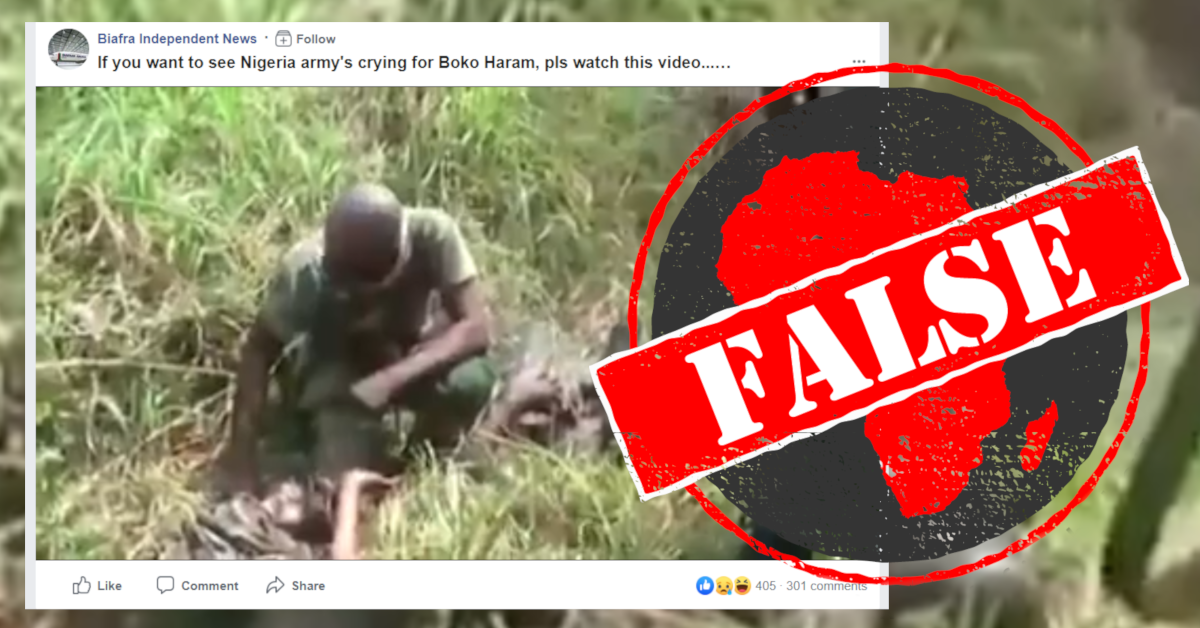A video of a soldier crying next to a dead body has been posted on the Facebook page Biafra Independent News.
It’s captioned: “If you want to see Nigeria army's crying for Boko Haram, please watch this video.” Boko Haram is a militant insurgent terror group based in northern Nigeria.
In the video, a vehicle burns while a black truck accompanied by heavily armed soldiers patrols the scene. Seconds into the video, a soldier wails next to two bodies. Smoke rises from one of the bodies.
Soldiers are seen moving what looks like a third body from the bushes to the side of the road. Amid the confusion, sporadic gunfire can be heard in the background.

Facebook users were quick to point out that the insignia on the soldiers’ uniforms shows the flag of the Democratic Republic of the Congo, not a Nigerian flag.
Others commented that the language the soldiers are speaking is neither English, the language of Nigeria’s government, nor Hausa, widely spoken in the country’s north. Users suggested it sounded more like Lingala, a language spoken in the DRC.
Using frame by frame analysis combined with Google’s reverse image search, we found a photo of the black truck and soldiers next to the burning vehicle shown in the video.
The photo reveals that the video was shot a few moments after Colonel Mamadou Ndala, a celebrated DRC colonel, was killed on 2 January 2014 in a rocket attack near the town of Beni in the country’s northeast.
Al Jazeera and CCTV posted videos of the aftermath of the ambush on YouTube. They show the soldiers Ndala commanded openly weeping.
Local and international media carried the story. Reuters reported that the colonel, largely credited with defeating the M23 rebel group in November 2013, died from injuries sustained after his convoy was ambushed in North Kivu province. Two of his bodyguards were also killed.
Voice of America reported that its correspondent Austere Malivika was in the convoy. He said that after the rocket hit, attackers tried to move closer to the convoy but were repelled by the soldiers – Dancan Bwire
It’s captioned: “If you want to see Nigeria army's crying for Boko Haram, please watch this video.” Boko Haram is a militant insurgent terror group based in northern Nigeria.
In the video, a vehicle burns while a black truck accompanied by heavily armed soldiers patrols the scene. Seconds into the video, a soldier wails next to two bodies. Smoke rises from one of the bodies.
Soldiers are seen moving what looks like a third body from the bushes to the side of the road. Amid the confusion, sporadic gunfire can be heard in the background.

Flag and language point to DRC
Facebook users were quick to point out that the insignia on the soldiers’ uniforms shows the flag of the Democratic Republic of the Congo, not a Nigerian flag.
Others commented that the language the soldiers are speaking is neither English, the language of Nigeria’s government, nor Hausa, widely spoken in the country’s north. Users suggested it sounded more like Lingala, a language spoken in the DRC.
Aftermath of ambush
Using frame by frame analysis combined with Google’s reverse image search, we found a photo of the black truck and soldiers next to the burning vehicle shown in the video.
The photo reveals that the video was shot a few moments after Colonel Mamadou Ndala, a celebrated DRC colonel, was killed on 2 January 2014 in a rocket attack near the town of Beni in the country’s northeast.
Al Jazeera and CCTV posted videos of the aftermath of the ambush on YouTube. They show the soldiers Ndala commanded openly weeping.
Local and international media carried the story. Reuters reported that the colonel, largely credited with defeating the M23 rebel group in November 2013, died from injuries sustained after his convoy was ambushed in North Kivu province. Two of his bodyguards were also killed.
Voice of America reported that its correspondent Austere Malivika was in the convoy. He said that after the rocket hit, attackers tried to move closer to the convoy but were repelled by the soldiers – Dancan Bwire
Republish our content for free
For publishers: what to do if your post is rated false
A fact-checker has rated your Facebook or Instagram post as “false”, “altered”, “partly false” or “missing context”. This could have serious consequences. What do you do?
Click on our guide for the steps you should follow.
Publishers guideAfrica Check teams up with Facebook
Africa Check is a partner in Meta's third-party fact-checking programme to help stop the spread of false information on social media.
The content we rate as “false” will be downgraded on Facebook and Instagram. This means fewer people will see it.
You can also help identify false information on Facebook. This guide explains how.


Add new comment